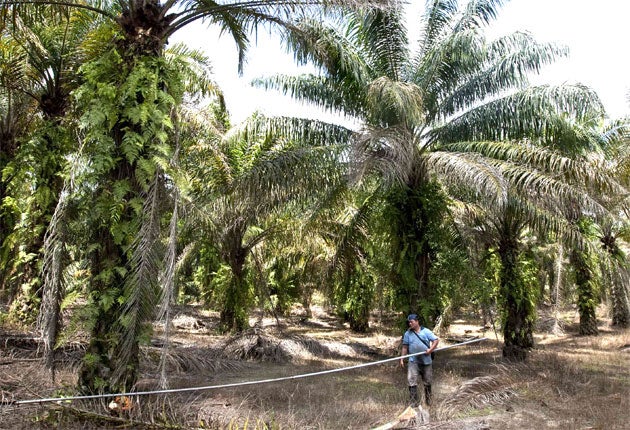Waitrose makes sustainable palm oil pledge
Supermarket responds to environmental concerns about its policy

Your support helps us to tell the story
From reproductive rights to climate change to Big Tech, The Independent is on the ground when the story is developing. Whether it's investigating the financials of Elon Musk's pro-Trump PAC or producing our latest documentary, 'The A Word', which shines a light on the American women fighting for reproductive rights, we know how important it is to parse out the facts from the messaging.
At such a critical moment in US history, we need reporters on the ground. Your donation allows us to keep sending journalists to speak to both sides of the story.
The Independent is trusted by Americans across the entire political spectrum. And unlike many other quality news outlets, we choose not to lock Americans out of our reporting and analysis with paywalls. We believe quality journalism should be available to everyone, paid for by those who can afford it.
Your support makes all the difference.Waitrose is to switch its own-brand foods to "sustainable" palm oil in a move intended to help prevent deforestation, climate change and other problems caused by the world's cheapest vegetable oil.
Setting out a radical new timetable on the controversy, the retailer said it would ensure supplies for 1,000 products were certified by the Roundtable on Sustainable Palm Oil (RSPO) by 2012. In the meantime, it will buy GreenPalm certificates for production, equivalent to its annual usage.
This turns Waitrose from one of the slowest-moving supermarkets on palm oil into one of the fastest. In a league table published by the wildlife charity WWF on 28 October, the supermarket group came a lowly 18th out of 25 UK retailers and manufacturers.
Another company that scored poorly, Britain's biggest baker, Warburtons, is in talks with the WWF about improving its policy. Palm oil – found in a range of foods and household products, including biscuits, chocolate, soap, and shampoo – is associated with human rights abuses and loss of wildlife, including the endangered orang-utan.
It is also a large cause of deforestation, which generates 20 per cent of global climate change emissions. Since The Independent published an investigation into the problems associated with the use of palm oil earlier this year, Nestlé, Mars, Cadbury and Marks & Spencer have announced overhauls of their sourcing.
Waitrose said one-tenth of its own-label range – 1,000 products – contained between 0.001 per cent and 4 per cent palm oil. Wherever possible, it said it was seeking to eliminate or minimise the ingredient, but added that it "continued to be important to the texture" of cakes, biscuits and pastries.
In a tacit admission that its previous policy had been inadequate, Mark Price, Waitrose's managing director, said: "Our mediocre rating in WWF's Palm Oil Buyers' Scorecard 2009 has toughened our resolve. We want to be part of the solution, not contributing to the environmental problems caused by the growth in palm oil use."
The supermarket chain will start work on reducing the amount of palm oil used in soap and biscuits, which account for 25 per cent of its usage. David Nussbaum, chief executive of WWF-UK, said the grocer was putting its words into practice. "We hope that this will encourage many other household names to take responsibility for their actions," he said.
Environmentalists are divided about the effectiveness of the RSPO; Friends of the Earth and Greenpeace say it is riddled with loopholes. In an interview last month, the Energy minister, Joan Ruddock, said that despite its shortcomings the scheme represented the best chance of saving the rainforests.
Changing their ways? How the stores score
* Sainsbury's has acted quicker than any other major retailer on palm oil, scoring 26 out of 30 in the WWF rankings, followed by Marks & Spencer on 25.5. Asda scored 21 and Tesco 16. Waitrose scored 8.5.
* Fourteen other British firms scored lower than 15, including Co-op (13), Morrisons (9.5), Lidl (8), Boots (6.5) and Aldi (0). ABF, which makes Kingsmill and Allinson bread, also scored 0.
Join our commenting forum
Join thought-provoking conversations, follow other Independent readers and see their replies
Comments